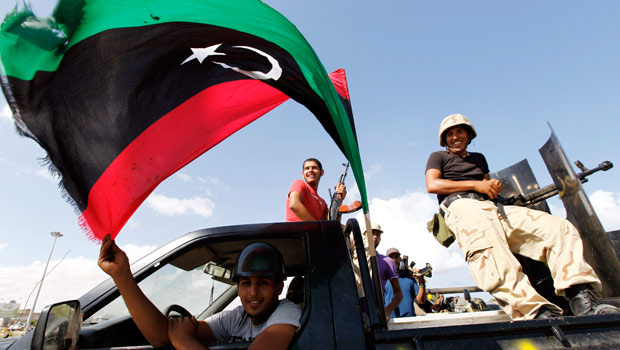The battle for Sirte, the former Libyan leader’s hometown, is proving to be one of the toughest for the new rulers and if prolonged, threatens to reignite tribal divisions that could hamper any attempt to unify the country.
“The situation isn’t good. There’s random shelling, rockets falling on people every day, falling on civilians,” resident Jamal Makhzoum said from the driver’s seat of a sedan heading west from the city.
When a man near the car interrupted, Makhzoum held up his hand and suggested it was not clear to him who was responsible for the shelling that has destroyed dozens of homes and prevented deliveries of much-needed food and medicine.
“Just a minute. These people say it isn’t them,” he said, gesturing toward Sirte. “And the revolutionaries here say it isn’t them. And every day we bury two or three people.”
Thousands of civilians are believed to be trapped inside the coastal city, where former rebels have traded volleys of rocket and machine gun fire with fighters loyal to Qaddafi for almost a month. The situation is hard to gauge as no journalists are inside the city and residents’ reports are contradictory.
Fighters for the National Transitional Council say they believe some residents of the city, which Qaddafi transformed from a remote fishing village into a modern city, still support him and a few may have taken up arms to defend him.
The city is home to many members of his small but powerful Gadhadhfa tribe and the former leader had once hoped to fashion it as the would-be capital of Africa after persuading leaders to meet there in 1991 to sign into being the African Union.
The fighters check every vehicle leaving the city and say their main priority is to protect civilians. They say they stopped firing artillery, tanks and heavy rocket launchers and have sent messengers inside the city to ask families to leave.
“Our priority now is the civilians,” said a Libyan engineer helping coordinate the assault who gave his name as Saleh.
Cars and trucks loaded with families, mattresses and food rolled past. Fighters handed out water, yogurt and biscuits.
“We will try to attack Sirte when we feel it’s empty. Some of the civilians are afraid to leave because Qaddafi gave them a bad picture about us,” he said.
Qaddafi’s spokesman told Reuters on Thursday, by phone from a location he did not disclose, that a combination of NTC artillery fire and NATO strikes had killed 151 civilians in Sirte over the past 48 hours.
That account could not be independently verified and there was no immediate comment from NATO.
Qaddafi exploited tribal divisions to maintain sway over Libya’s vast territory, and many Libyans say his tribe benefited — creating allegiances which still hold firm now.
“All the tribes that were relatives of Qaddafi, they got salaries without working. They had a different life from other Libyans,” said Ismail Taweel, a fighter on Sirte’s outskirts. “When Qaddafi goes, they think it will all be over.”
Like most fighters surrounding Sirte, one of just two major strongholds held by Qaddafi loyalists, the commander Saleh is from Misrata, a city to the west devastated in a siege which killed more than 1,000 residents.
The fighters have advanced slowly into Sirte after being repulsed in a street-by-street battle on Saturday, now patrolling the outskirts, trading sporadic rocket fire with loyalists and ushering hundreds of civilians away from the city.
“We have heavy weapons — Grad launchers, tanks, rockets — but we’re not using them because of the civilians. We can only use them on military camps outside the city,” said El-Tohamy Abuzein, a brigade commander near the frontline.
The assault on Sirte has appeared better coordinated than in the other main Qaddafi bastion, Bani Walid, where disorderly retreats have been the norm. Fuel tankers fill pickups and volunteers give sandwiches and juice to fighters. Men in army fatigues pace the front, issuing orders through walkie-talkies.
But a lack of training and discipline among some fighters has held up the advance at times. One fighter nearly shot himself when he fired a celebratory round into the side of the barrel of a captured tank, sending the bullet ricocheting.
Another group fired a Grad missile into a lamppost during a battle, knocking off the light and sending the rocket crashing to the ground about a hundred meters away from their position.
It is unclear how much resistance they face inside the city. Saleh, the commander, said he believed Qaddafi’s side had around 1,000 fighters, including 120 “professional snipers.”
The NTC also coordinates air strikes with NATO, whose jets frequently roar overhead.
Residents who have fled said they often weren’t sure where the rockets were coming from — Qaddafi loyalists, NTC forces or NATO jets. But for many, it hardly matters.
“People inside are fed up. There are explosions everywhere. We don’t know where the bullets will come from next. Houses are destroyed, cars are broken,” said a man who gave his name as Abubakr.
“No one is safe in their homes. It’s just random fire and that’s it.”










